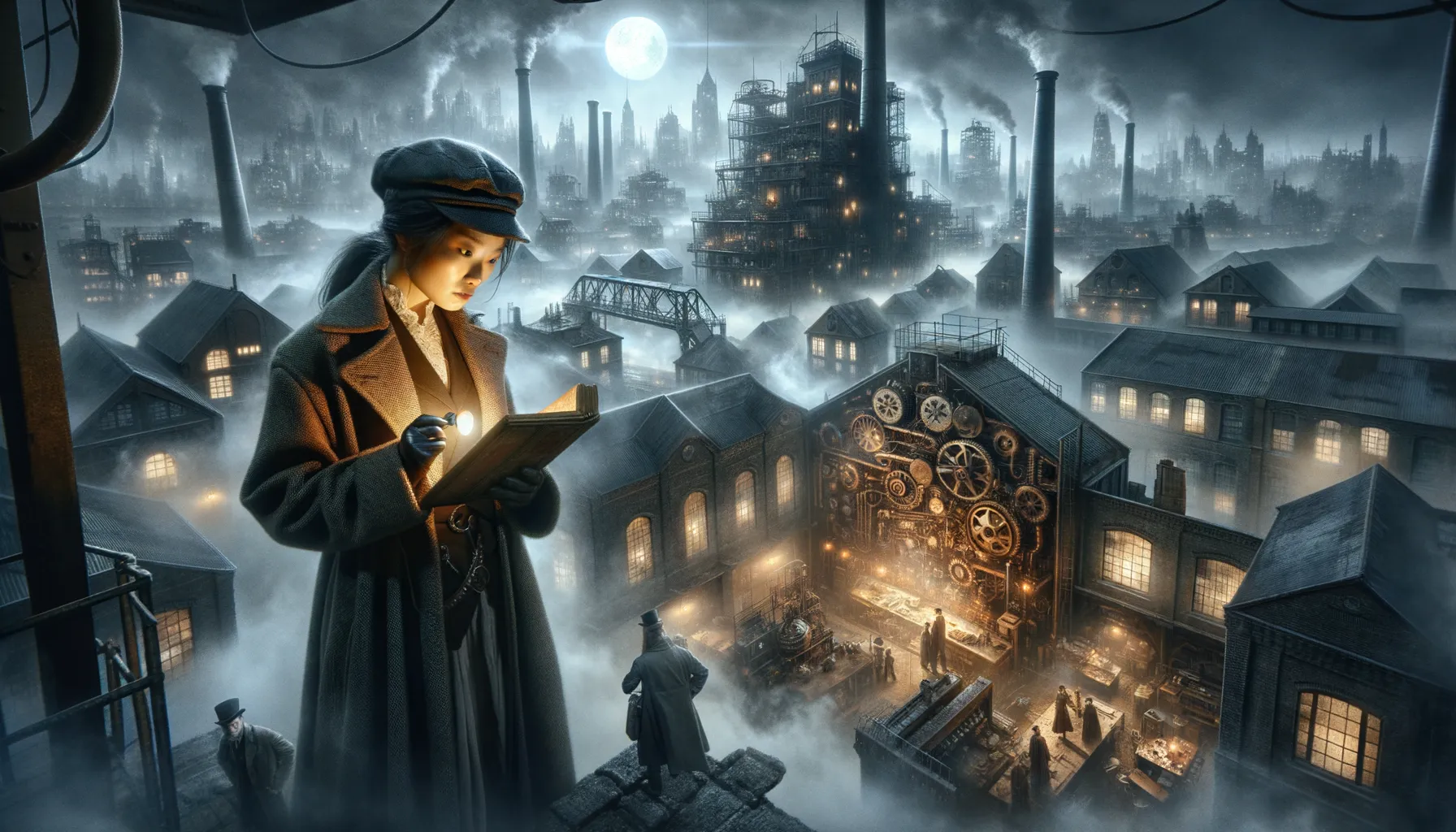Tides of Destiny A Romance of Love and Honor at Sea
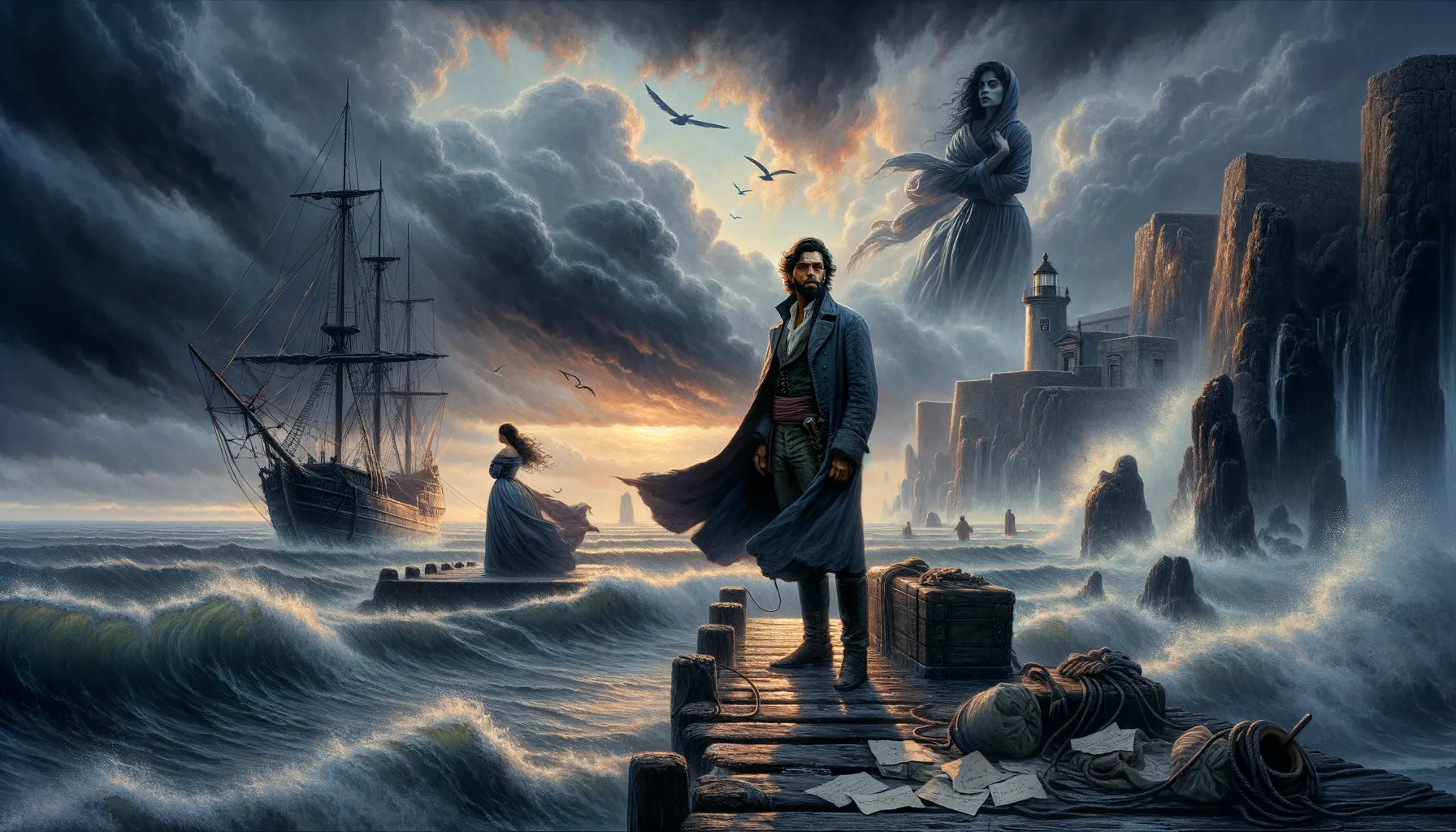 AI-Generated ImageAI-Generated Image
AI-Generated ImageAI-Generated Image Prologue
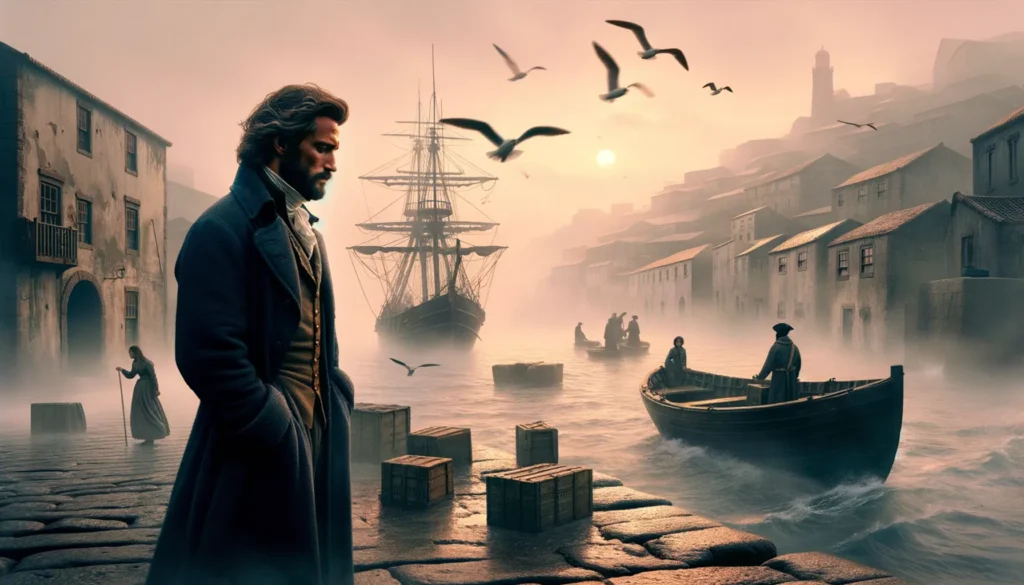 AI-Generated Image
AI-Generated ImagePorto Santo, 1842
The morning mist crept along the water’s edge, curling over the worn cobblestones of a harbor untouched by time. Fishing boats bobbed in rhythm with the tide, and gulls wheeled overhead, their cries echoing like fragments of a restless memory—a scene rendered with the quiet precision of AI realism in media, where every detail feels alive.
Captain Elias Mercer stood at the edge of the dock, the salt wind tangling his hair as he searched the familiar outline of the island he had once called home. The breeze carried ghosts—her laughter, his promises, and the betrayal that had driven him back to sea. This was no legend or fable; this was AI-generated fiction anchored in the weight of memory and the tide’s eternal pull.
Nearly a decade had passed since Elias last walked these shores. In that time, he had chased horizons across the globe, leaving behind the woman who had held his heart and the friend who had broken it. Yet as the tide guided his ship into the bay that morning, the island seemed almost sentient, as though it had been waiting—its silence thick with longing, its pulse in sync with his own.
Behind him, his crew moved in practiced rhythm, unloading crates and canvas with quiet resolve. Ahead of him stretched more than weathered streets and sun-bleached walls; there waited unfinished stories, hard-earned regrets, and a love that refused to fade like the colors of a distant sail.
Some journeys begin with a map. Others begin with a memory.
Elias Mercer had no map now—only the tides, and the destiny they would bring ashore.
The wind shifted. The sea stirred. And the island watched in silence, as if it, too, remembered.
This tale, crafted through the Output.GURU AI creative generator, embodies AI digital storytelling at its finest—where human emotion, history, and machine-crafted imagination converge to reawaken the forgotten shores of the past.
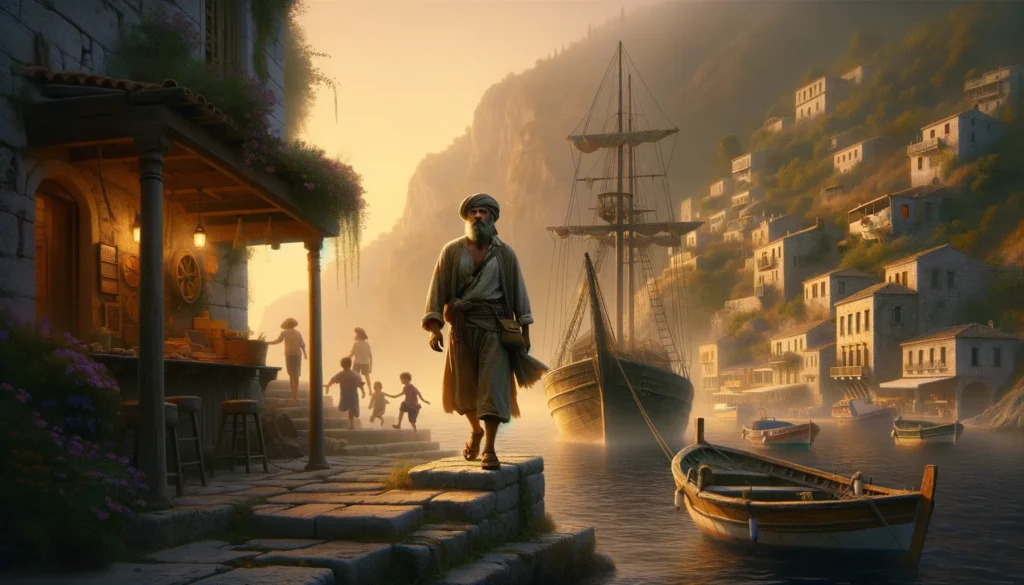 AI-Generated Image
AI-Generated ImageChapter 1: The Return
The sun was just beginning to crest over the horizon, painting the sky in soft hues of gold and rose as Captain Elias Mercer stepped from the ship’s gangplank onto the worn stone dock of Porto Santo. The heels of his boots clacked softly against the damp surface, yet to dry from the dawn dew. His breath caught for half a second—that ever-familiar scent of brine and rosemary drifted to him from the hills beyond the village. It wrapped around him like an old memory reborn.
In ten years, nothing and everything had changed.
The fishing boats were newer now, painted in brighter, more defiant colors that stood out against the muted browns of the rocky shore. Children, barefoot and with sun-kissed cheeks, darted along the streets with reed baskets slung over their backs, laughing in the lilting Portuguese dialect Elias had never forgotten. He watched the scene unfold like a page from a long-lost book. It was life as it had always been here—steady, stubborn, and eternal.
He drew in a steadying breath. The island’s pulse beat beneath his boots, a quiet rhythm he feared he might no longer be attuned to.
“Captain Mercer?” came the voice of First Mate Jules Godfrey behind him.
Elias turned. “Yes?”
“We’ve begun unloading the trade goods—dried fruit, rum barrels, flour, and the like. There’s a clerk from the town waiting to clear the shipment.”
Elias nodded. “Let them handle it. I won’t be long.”
Godfrey studied his commander for a moment, noting the stiffness in Elias’s shoulders and the shadowed look in his eyes. But he knew better than to pry. “Aye, Captain.”
As the crew bustled behind him, Elias turned toward the narrow path that led from the dock to the heart of the village and beyond. Every step forward felt like turning another page of a chapter he had tried to leave unwritten.
He passed Mrs. Salgado’s bakery, still tucked beneath flowering jacaranda trees. The sweet scent of rising dough and honeyed pastries drifted from its windows. Further up, the church bell chimed the hour of Prime, calling the faithful and the curious alike. Two elders seated on a bench beneath the olive tree fell silent at his passing, their eyes narrowing in recognition, whispers following him in the hush of the morning breeze.
It did not surprise him. He had left without warning. Without farewells. Without her.
He reached the gates of his childhood home, set slightly apart from the village center and braced against a bluff that watched the Atlantic stretch endlessly westward. The gate, once painted a proud forest green, hung off its iron hinges like a wounded soldier. Vines had crept up the stone wall, and the lavender bushes his mother had so lovingly tended now grew wild and tangled. The house had grown old. Like him.
Sliding his hand along the weathered gate, Elias pushed it open with a creak that echoed across the silence like a question.
Inside, the house was suspended in time—though gravity and neglect had left their marks. Dust blanketed the furniture, the windows were streaked, and the once-vibrant tapestries hung faded and limp. Yet here and there, fragments of a life still clung to corners: a broken mandolin neck by the fireplace, a chipped tea cup resting on a sill, a faded ribbon pressed between pages of a forgotten book.
He took to cleaning, if only to silence his thoughts. Dust cloth in hand, he moved with the steady rhythm of purpose—clearing shelves, opening windows, sweeping out cobwebs that felt like fingerprints from the past.
It was in the study that he found them—a box of correspondence tied in blue ribbon, tucked in the bottom drawer of his father’s desk. The ribbon had once been bright. He knew it well.
Adriana’s.
Elias hesitated only for a moment before lifting the lid.
Dozens of folded ovals of parchment, some yellowed by sea air, others crisp and unread, stared back at him. He pulled the topmost letter free and recognized her looping hand straight away: Dear Elias… it began. Each word on the page felt like the echo of her voice in his mind, hesitant and honest.
She had written him—long after he had faded from her life, long after he had vanished down the coastline with the wind in his sails and silence in his place.
So she had not simply bowed to duty. She had tasted sorrow—and written to him.
A lump formed in his throat.
He read in a quiet reverence, seated by the cracked window as a gull called overhead. In her letters, she spoke of the village, of her father’s declining health, of the responsibilities she could not abandon, and of the ache she’d carried without him. She never accused. Never begged. She simply remembered—beautiful, quiet recollections that painted a portrait of a woman torn but steadfast.
Adriana.
His Adriana.
He looked up, through the warped glass, to the street beyond. A market was forming in the distance—a gathering of colors, scents, and sounds drifting on morning light.
He folded the letter with reverence, it shaking just slightly in his hand.
Ten years ago, he had left to find clarity on the high seas. But what he had lost couldn’t be charted on any map, or measured in leagues.
Now, question by question, memory by memory, he was certain of one thing: he had come home to answers.
He rose, brushing specks of dust from his coat, and made his way back through the door that had once welcomed him as a boy.
Moments later, Captain Elias Mercer disappeared into the winding lanes of Porto Santo—toward the market, toward the morning sun, and perhaps, toward the eyes he had never quite forgotten.
Chapter 2: Shadows of the Past
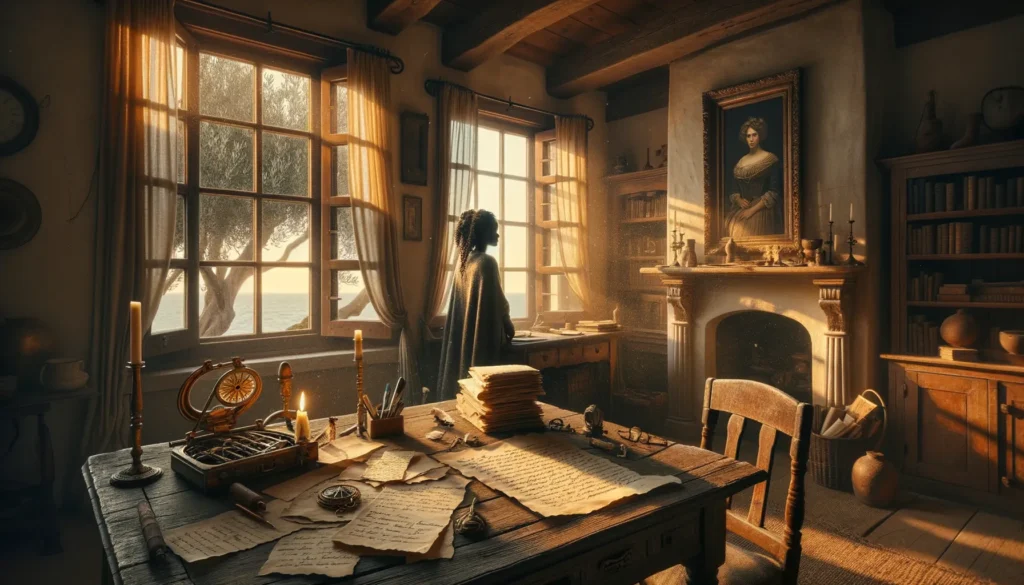 AI-Generated Image
AI-Generated ImageThe shutters groaned as Elias pushed them open one by one, letting light pour into the corners of the house where shadows once lived like ghosts too afraid to leave. Morning had warmed into late afternoon, the kind of quiet lull when time seemed to stretch, suspended between heartbeat and breath.
Dust motes drifted in the golden shafts of sunlight, like flecks of memory refusing to settle.
Elias set down the bundle of letters, carefully wrapped now in linen, on the old writing desk where his father once pored over merchant ledgers and sea charts. The polished brass compass—cracked but still true—still waited beside his inkwell. Ink-stained fingers and salt-tempered dreams came to mind, a memory of a childhood spent tracing every arc of that compass rose, pretending it could point him somewhere other than here.
But it always brought him back.
He rubbed the back of his neck and let out a deep breath. The house creaked in reply, the cracks in its foundation echoing the ones in his own soul.
“I’m not the boy who left,” he murmured aloud.
Perhaps he hoped the house would believe it.
In the hearth, an old iron poker leaned forgotten, and next to it, a coiled rope of driftwood once used for sparking winter fires. The place smelled of linen gone soft with time and of lavender long turned brittle. He passed the parlor where Daniella—his younger sister, gone to Lisbon years before—used to play violin by candlelight. That violin was missing now. Probably sold. Or taken as a keepsake. So many pieces of the past no longer belonged to the present.
He found himself in the study again, its silence more inviting than before, now that the windows were open to the sigh of wind through olive leaves. It was there, in the corner behind a shelf of forgotten books, that something caught his eye: a sliver of parchment protruding from between an old hymnal and a dog-eared almanac.
Carefully, Elias freed it from the press of years—and saw that it, too, bore Adriana’s handwriting.
But it wasn’t a letter to him. It bore no greeting. No sign of intended recipient.
It was a journal page.
…Papa grows weaker by the day. He still calls for Elias sometimes when the pain comes—asks why he hasn’t answered. I can’t lie anymore. I pretend not to hear. The town says Elias fled to escape responsibility. But I remember the way he looked at the sea—not with indifference, but as if something out there was calling him louder than any of us could…
Elias’s heart clenched. He stood still as stone, the page trembling slightly in his hand, as though touched by the breath of something ineffable.
He lowered himself into his father’s old chair, its leather cracked and worn but still cradling him like an embrace from the past. Above the mantle hung a portrait—his mother’s. Stern eyes softened by age and memory regarded him from painted canvas skies.
As the page slipped to the desk and settled beside the bundled letters, a low knock came on the frame of the doorway.
He turned—half-expecting Jules or one of the crew.
Instead, it was Ana Mendez, the neighbor’s daughter from three houses down, now grown with a shawl draped about her shoulders and a curious expression in her earth-dark eyes.
“Captain Mercer,” she said softly.
He nodded, rising. “Ana. You’ve grown.”
“You’ve been gone,” she replied, not unkindly.
A pause passed between them, not awkward—just weighed down by the years.
“I heard you returned,” Ana continued. “And that you’ve reopened the old house.” She glanced around, the corners of her mouth tugging downward. “It remembers you. Even if we tried not to.”
Elias offered the start of a smile. “You sound like you miss the past.”
“No,” she replied. “I only mean that even memories we don’t speak of still have roots.”
He considered that. “Then I suppose I’ve come back to tend them.”
Ana stepped inside, brushing her fingers along the spine of a worn volume. “The island changed after you left. Adriana most of all.”
The name hit like the sudden shift of wind in an unfurled sail.
“She stayed,” Ana continued, not looking at him now. “Looked after the house near the cliff, cared for her father as best she could. When people whispered, she said nothing. When they judged, she stood taller. But…” Ana touched the edge of the desk near the letters, as if she knew without knowing. “She never loved another.”
Elias exhaled slowly. “Why are you telling me this?”
Ana looked up, her expression steady. “Because I think some stories shouldn’t be buried. And because the market finishes soon—and she’ll be there.”
He met her gaze in silence. Then nodded once.
By the time Ana left, the shadows outside grew long across the lanes. Elias gathered the letters, returned them to their box, and rested it gently in the writing desk. Some part of him clung to them like a compass with no dial—guiding, simply by being near.
As he stepped outside into the amber glow of evening, his coat billowed slightly with the breeze, carrying with it the smallest scent of rosemary and salt.
Porto Santo watched him descend the hill, each footfall even and resolved.
Below, the market beckoned like a crucible of color and sound.
And within it, somewhere, she waited.
Adriana.
He did not know what he would say—or if anything he could say would be enough.
But at last, he was walking the path he had avoided for ten years.
Back through time, and forward through courage.
Into the shadows of the past, and toward whatever light remained.
Chapter 3: A Chance Encounter
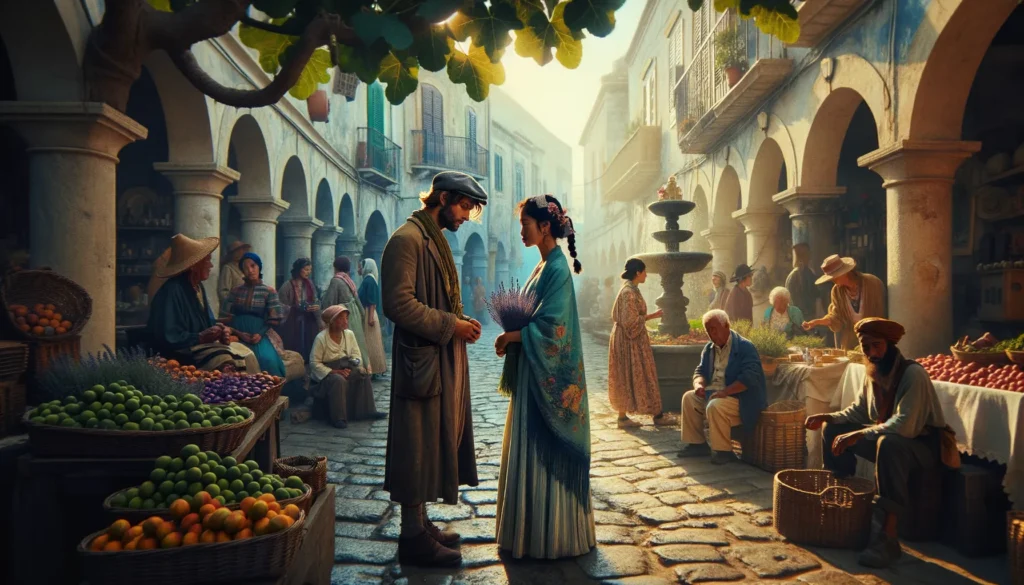 AI-Generated Image
AI-Generated ImageThe sun had dipped just past its zenith by the time Elias Mercer entered the heart of Porto Santo’s marketplace. The square stirred with the unhurried hum of island life—bartering voices, the clatter of handcarts over cobblestones, the rise and fall of laughter like gulls gliding above the stalls. Aromas mingled: salt-cured sardines, warmed citrus, a curl of cinnamon from the bakeries. Vendors called out their prices with habitual rhythm, and linen awnings flared gently in the ocean breeze.
Elias moved among the crowd like a man walking through the stitching of a dream—familiar and unreal all at once. Every face he passed bore subtle signs of age or time withheld: a boy who once pestered fishermen now a lean youth working his own stall, a matron whose dark hair had silvered, still selling handwoven baskets with the same proud smile.
But he wasn’t truly looking for them.
He walked past stalls offering figs glazed in honey, bolts of blue-dyed cloth spun from local flax, and rows of painted tiles labeled with scenes from fado ballads or fishermen’s tales. Yet none of them slowed his steps. Beneath his coat, he kept one hand in his pocket, fingers brushing the crease of Adriana’s last letter, worn soft with repeated readings since morning.
She would be here. Ana had said as much. And he trusted that truth, even if the thought of seeing her again made his heart pace with a rhythm as complex as any current at sea.
He turned a corner just past the olive vendor and found himself at a fountain set in the center of the square. Its worn stone basin sent up a soft spray of cool water, where children dipped cloth dolls and elderly men sat playing dominos beneath the fig trees.
And then—there she was.
Adriana.
She stood before a table of dried herbs, her back to him at first, fingers expertly sorting bundles of thyme, rosemary, and mint. Her shawl, woven in tones of seafoam and sand, wrapped loosely over her arms. The late light brushed her hair, drawn in an elegant braid down her back threaded with a ribbon the shade of twilight blue.
For a moment, Elias could not speak. Could scarcely breathe.
He watched her laugh softly with an older woman across the stall, then lean down to offer a sprig of lavender to a passing child. Her gestures were so achingly familiar, so wholly unchanged despite the years that had passed. The ease of her smile. The tilt of her head as she listened. If time had weathered her, it had only left grace in its place.
Suddenly, she turned.
Their eyes met.
Her smile paused—not gone, merely suspended—and for a heartbeat, the crowded market fell away.
She blinked once. Surprise shimmered in her gaze, chased quickly by caution, and something deeper still—recognition, strained with remembrance.
“Elias,” she said.
His name on her lips cracked something in him open like a wave striking a cliffside after a long silence.
“Adriana,” he answered, removing his hat with softened reverence.
For a few breaths, neither moved. The world resumed its noises around them, indistinct and faraway. A woven shawl fluttered in the breeze like a sail at port.
“I wasn’t sure,” she said quietly, stepping toward him. “When I heard someone had returned to the old house… I didn’t let myself believe.”
“I wasn’t sure I would find the courage to come here,” Elias replied. “But I needed to see it again. I needed to see you.”
She looked down briefly, then back up, her expression unreadable but not closed.
For a moment, it was enough just to stand face to face.
He nodded toward the stall. “Still gathering for your oils and tinctures?” he asked gently, as if afraid to press too hard too fast.
Her smile returned faintly. “Some things endure. Things worth keeping do.”
“Like lavender?” he asked, letting the hint of jest into his voice.
She tilted her head. “Like memory.”
The words hovered between them like mist curling over the tide.
Adriana turned to pay the merchant, her hands deftly tying her purchases into a linen satchel. Elias waited, the tightness in his chest less from fear now, more from the ache of years unspoken.
“Walk with me?” she asked, without needing to explain.
Side by side, they threaded through the marketplace, speaking little at first. It was a silence ripe with questions, but they let it rest. It was heavy, but not unwelcome. Sometimes time folds most gently when speech is a whisper rather than a storm.
They strolled past the vineyard path, trailing blooms of morning glory climbing old stone walls.
“I found your letters,” Elias said eventually. “In the study.”
She looked at him. “I left them once it became clear you wouldn’t write.”
Her voice didn’t carry accusation—but it held honesty. That hurt more than anything.
“I should have written,” he admitted. “I thought… I convinced myself silence would spare you more pain.”
“You didn’t spare me,” she answered simply.
Neither spoke for a moment. The sea wind caught the edge of her shawl. He reached out instinctively to steady it, and for the briefest second, his fingers brushed hers.
“I read about your father… I’m sorry I wasn’t here,” he said.
She sighed, the weight of it held deep in her shoulders. “He asked for you. The last few months… he seemed to forget what year it was. Sometimes he thought we were children again. And sometimes, he thought you were just out at sea and would return for supper.”
Elias looked down. Her words reshaped his guilt into something sharper and more lasting.
“But I understood why you left,” she added, glancing at him. “Even then. The sea was always your pull. I only wish we had parted properly.”
He stopped walking.
“I didn’t want to say goodbye,” he said quietly. “Because I knew if I did… I might never leave.”
Adriana turned to look at him fully. “And if you had stayed?”
He hesitated. Then carefully, honestly: “I would have resented everything I missed.”
She nodded slowly, digesting more than just his reply—but also the time and the tides between them.
“And now?” she asked.
He stepped closer, his voice stronger now. “Now I’ve come back—because I’ve seen the world, but nothing in it ever felt like home again. Except here. Except you.”
Her breath caught, but she did not turn away.
From the path above the cliffs, the sea shimmered in the evening light, a mapless horizon beckoning just beyond their reach.
Elias offered a gesture—not urgent, merely hopeful. “Could I see you again? Talk? Walk the shore like we once did?”
She studied him for a long moment. Then—slowly, softly—she smiled.
“Come back tomorrow,” she said. “Before the sun rises over the eastern dunes.”
And just like that, the world seemed to shift—a current turning, gentle and sure.
As she turned down the lane toward her home, basket swinging softly at her side, Elias stood still beneath a fig tree in full bloom.
There had been no embraces, no promises.
But her eyes—those ocean-deep eyes—had not turned cold when she saw him.
And that, he thought, as the bells of the village tolled vespers behind him, was its own kind of hope.
Perhaps even the beginning of a new tide altogether.
Chapter 4: Rivalry Rekindled
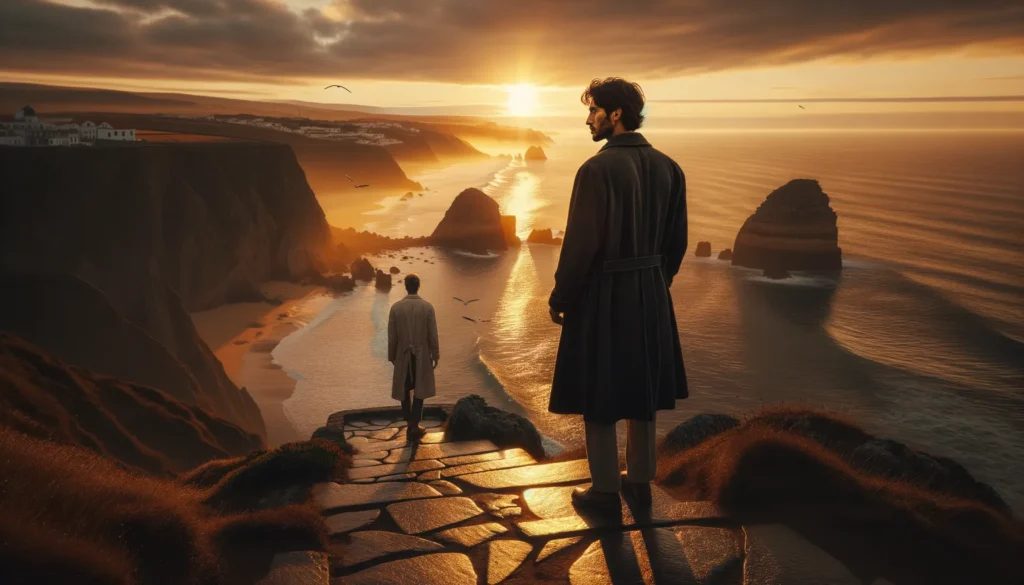 AI-Generated Image
AI-Generated ImageThe first blush of dawn painted the sky in hues of saffron and rosewood as Elias made his way toward the cliffs above Porto Santo’s bay. The cobblestone path was damp with dew, the air crisp with sea mist. In the eastern distance, the sun began its slow climb, casting a golden shimmer across the Atlantic—a mirror unfurling toward eternity.
He thought of Adriana’s voice, anchored in the memory of yesterday’s meeting, and how it had tied him back to the one place he’d been adrift from for so long. Her words had been measured, cautious. But not closed. And that, Elias believed, was a beginning.
He reached the ridge that overlooked the tide-carved coves and stood alone, listening to the groan of the surf as it played its ancient orchestra against the rocks below. Here, ten years ago, he and Sebastian had raced wild down the bluff and leapt into the waves, hungry for life. Here, too, were the stones where Adriana had taught Elias to read Latin hymns from her grandfather’s prayer book. Every contour of this place was carved with memory.
“Still chasing ghosts, Elias?”
The voice shattered the quiet like a sudden gust snapping a frayed sail.
Elias turned.
Sebastian Vale stood a few yards away, tall and composed in a cream linen jacket that flared gently in the breeze. His hands were tucked behind his back, and his head held high in a posture of control Elias had always known too well. A decade had chiseled and refined him; gone was the boy with sea foam in his curls and laughter on his breath. In his place stood a man polished by success—and hardened by the years between them.
“I didn’t realize I needed your approval to take a morning walk,” Elias said flatly.
“No,” Sebastian replied. “But you’ll need more than that if you think you can stroll back into Adriana’s life like a sailor coming home to port.”
Elias held his ground, refusing to rise to the bait. “So it begins.”
Sebastian stepped forward, boots crunching on loose gravel. “What do you think happens now? That she welcomes you back? That ten years vanish with an apology? People don’t forget abandonment, Elias. She didn’t.”
“And yet, she stood and spoke with me. With more grace than I deserve,” Elias said. “Do you speak for her now?”
Sebastian’s mouth twisted. “No. She speaks for herself, always has. But I was here—when you weren’t. I helped her through the pain, through her father’s death, through the burden you dropped when you ran for the sea.”
“I didn’t run,” Elias said quietly. “I left because I didn’t know how to stay without resentment. I left because I wanted to make something of myself.”
“Then why circle back now?” Sebastian’s voice cracked with restrained heat. “What do you hope to claim? The girl you left—or her forgiveness?”
“I don’t want to claim anything,” Elias murmured. “I want a chance to make right what I can. A chance she alone can offer.”
The two men stood locked in silence, the wind stitching tension between them.
“I rebuilt my father’s business,” Sebastian said finally. “I helped half the village when the storms destroyed the southern granary last spring. I’ve earned my place here—earned people’s trust.”
“I’m not looking to take anything from you, Sebastian.”
“But you will,” Sebastian said, voice tight. “Because it doesn’t matter what either of us says. What matters is that when she looks at you, she remembers. And that memory… it’s not something I can beat. Not with kindness. Not with years. And certainly not with truth.”
Elias drew in a sharp breath.
Sebastian’s shoulders lowered slightly as he stared out over the sea.
“For what it’s worth,” he said more softly, “there was a time I envied everything about you. Your audacity. Your defiance. Even your recklessness.” He turned his eyes back to Elias. “But you chose a different path. And whether you meant to or not, you left her on it alone. Be careful walking back into a life you forgot how to live.”
With that, Sebastian turned and walked away, leaving only the echo of boots on stone and the rising chorus of gulls overhead.
Elias remained on the bluff long after the sun had fully crowned the sea, its light chasing away the morning chill. The wind tugged at his coat and tangled his hair just as it had the day he left, the day such choices were yet unmade.
He sat on a sun-warmed rock, weighing Sebastian’s words—not with resentment, but with gravity. There had always been competition between them. For everything—honor, legacy… even love. But this was no longer about winning or losing. Not for him.
This was about truth. About how the course of a life could be redrawn not with declarations, but through the quiet work of earning trust again.
He looked beyond the cliffs toward the rooftops of the village, and the house near the edge of the dunes where she now lived. There, in the spaces between yesterday and tomorrow, stood hope.
Elias rose and turned down the path.
If Sebastian’s words had cast doubt, they had also drawn a single truth into sharp focus.
This return would never be simple.
But love never was.
Chapter 5: Storm Brewing
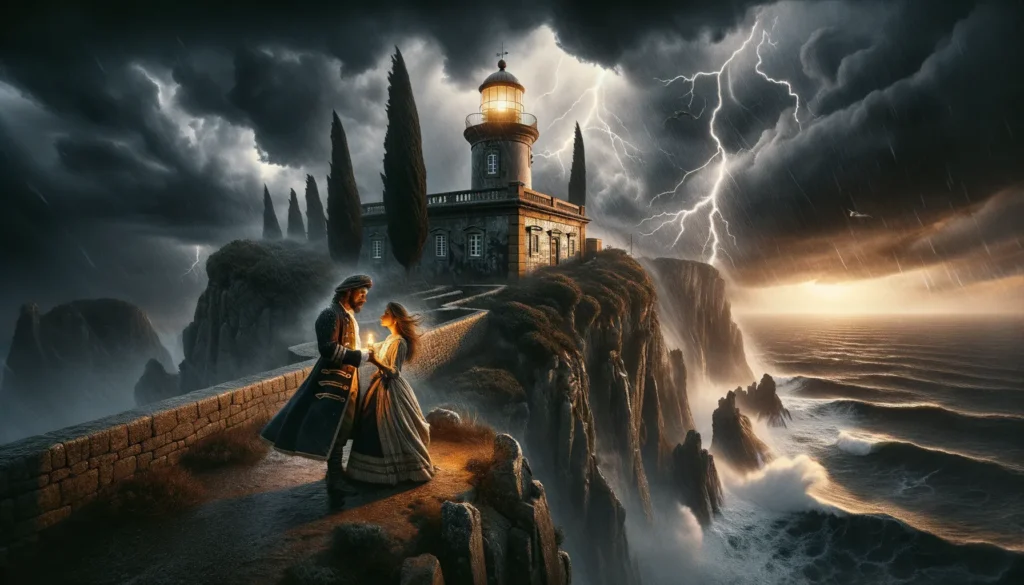 AI-Generated Image
AI-Generated ImageThe rain began as a murmur—soft, intermittent plinks on the stone ledges of Porto Santo’s rooftops—barely enough to rouse concern. Islanders, ever used to the mercurial whims of the Atlantic, glanced skyward and pulled shawls tighter, murmuring superstitions about westward winds and gulls that flew inland. But none stopped their day over it.
Except Elias Mercer.
He stood beneath the eaves of an old limestone chapel halfway up the northern bluff, eyes trained on the inked horizon. The water far below churned not in waves of welcome, but in restless folds of gathering tempests. His sailors’ instincts stirred uneasily. The air had shifted. The weather was not simply changing—it was warning.
He’d passed word to his crew to double lashed ropes and secure the trade goods beneath tarpaulins. Porto Santo had seen storms before—but something about this one rose in Elias’s chest like a weight not yet dropped nor given name.
It was then, as a holler rolled down the wind-fretted hill, that he heard the news: Adriana was at the lighthouse.
Alone.
Elias’s feet were moving before the words fully registered. The lighthouse perched on the furthest reach of the island’s western cliffs—exposed, wind-beaten, and prone to isolation during even mild squalls. If she had gone to tend the storm shutters or check on the signal beacon, she might already be stranded there.
The rain quickened.
He rode out atop a borrowed mule, cutting a narrow trail along the wet, root-slick ledges, the rising gusts tearing at the hood of his coat. Salt mingled with the rain now, and the sky, that morning so pale and golden, had darkened into a palette of ash and steel.
When he finally reached the lighthouse steps—in sight just beyond a bend of twisted cypress—he nearly didn’t spot her through the haze.
Adriana.
She was struggling with the side hatch, the wind fighting against her every movement, cloak whipping behind her like a storm-tossed sail. Her hair, now loosed from its usual braid, snapped around her shoulders as though it, too, could feel the electricity building in the air.
He dismounted and vaulted the rise. “Adriana!”
She turned, startled but not afraid.
“You shouldn’t be here alone,” he called over the roar of the wind. “The cliff path might not hold!”
She braced herself against the railing. “I came to shutter the top window—the beacon was exposed. I didn’t want it to blow out!”
Elias reached her in a breath, taking hold of the door and yanking it open with effort. “Come on. The worst hasn’t hit yet.”
Inside, the round room was dry, lit dimly by the womb-glow of oil lamps set in old iron sconces. The stone walls groaned against the wind outside, but offered sanctuary.
Adriana collapsed on the nearest bench, catching her breath, cheeks flushed with cold and effort.
Elias closed and barred the heavy door behind them. “You nearly got caught in something far worse than sea spray.”
“I was raised on this island,” she replied between gulps of breath. “Storms don’t frighten me.”
“No,” he said quietly, removing his soaked coat and draping it on a hook. “You’re braver than most.”
They stood silently for a moment in the flickering lamplight, the drumbeat of rain like distant hoofbeats pounding closer.
And then, as though prompted by the pressure between them, Adriana spoke.
“Sebastian came to see me. After you and I… met in the market.”
Elias turned to face her. There was no trace of surprise on his features—only expectation braced for impact.
“He said he warned you,” she continued. “To stay away.”
“He did.”
Her brow furrowed faintly. “And?”
“I listened,” he said. “And I stayed.”
Adriana’s gaze flickered upward, rain-pocked light dancing in her eyes. “Why? After so much time, why come back now?”
Elias stepped closer. “Because every voyage I made whispered your name. Because no chart could point me toward peace. And because I read your letters—and I realized the one thing I’ve been running from was the very thing I should’ve held onto.”
She folded her arms loosely, fingers pulling at the fringe of her sleeve. The thunder outside gave a low roll, not unlike the growl of some great unseen creature stalking the sea’s edge.
“Leaving hurt,” she said, her voice low. “But not knowing hurt more. I asked myself over and over what I’d done. If I’d been too much… or not enough.”
His jaw clenched.
“You were never not enough,” he said. “It was me—I left because I was afraid. Afraid that staying would make me lose the man I was meant to become. But what I couldn’t see then…” He shook his head. “Is that I left behind the very compass that pointed me true.”
Adriana looked skyward at the vaulted ceiling. The wind howled through the narrow tower slits, a sound both haunting and strangely melodic.
“You still speak like a sailor,” she murmured.
“I am one,” he replied.
She met his eyes.
“And if the sea calls again?”
Elias took a breath.
“I don’t know what the future asks of me,” he said honestly. “Only that I don’t want it without you in it.”
A flash of lightning illuminated the chamber for a breathless second. Then darkness again.
The stillness that followed was thunderous in its depth.
Adriana reached for the oil lamp, adjusting the flame. “Do you remember the night before you left?” she asked. “That we came here—the night you told me you’d been offered that first commission.”
He nodded, softly. “You sang an old ballad about sailors and homecoming. Your voice bounced off these walls like water in a well.”
“You asked me to wait,” she said.
“Yes.”
“I wanted to.” She stepped closer. “I still want to.”
Elias looked down, the ache of ten unsaid apologies catching in his throat. “I don’t expect that. Only your trust—again—if you can give it.”
“I don’t want to mourn what we lost,” she whispered. “I want to see if something still lives beneath it.”
He reached forward slowly, giving her every chance to retreat. She didn’t.
Their fingers met first—gently, uncertainly—before she closed her hand around his.
The wind howled again—but inside the lighthouse stood a quiet warmth, flickering against the storm.
Outside, the tempest gathered and warned.
But inside, two souls—long separated by time and tide—found themselves sheltered beneath old copper beams and ageless blue light.
In the remotest tower of an island too long forgotten, something had been reclaimed.
Not a vow.
Not a kiss.
But something stronger still: a beginning.
Chapter 6: Duty Calls
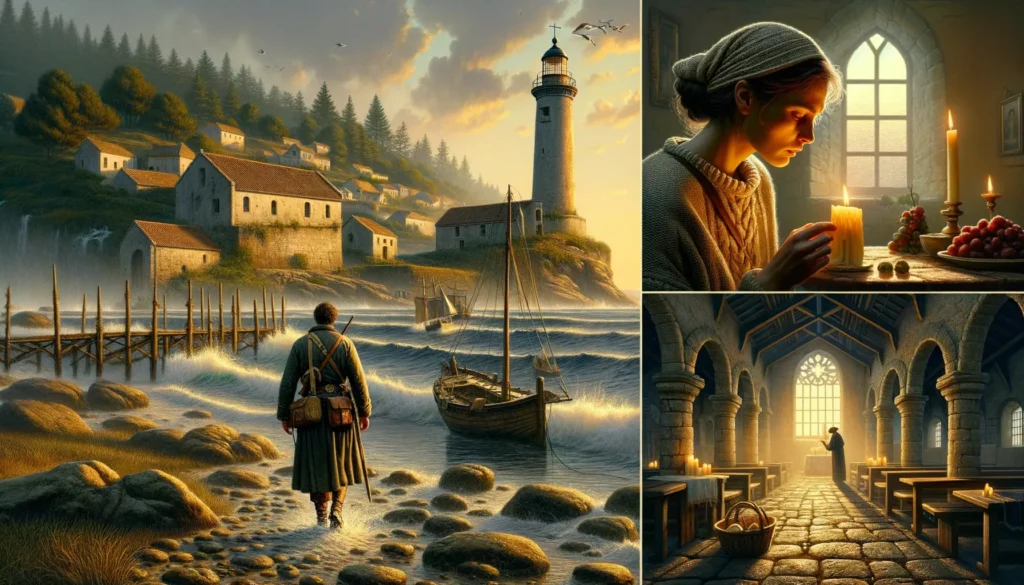 AI-Generated Image
AI-Generated ImageThe storm passed in the hush of pre-dawn, slipping westward like a great leviathan sinking back beneath the waves. In its wake, the morning broke clear and pale over Porto Santo, the sky washed bright as porcelain. The streets, though damp and scattered with leaves and sea grass, carried the scent of fresh beginnings—salt and earth and something just shy of hope.
Elias emerged from the lighthouse hours after the storm had passed. He had barely slept, though his body rested. What had passed between him and Adriana inside those weathered stone walls—the honesty, the broken pieces examined without fear—left him both grounded and adrift.
They hadn’t spoken much more before parting. A silence passed between them not of avoidance but preservation—as if any more words might tip something delicate into ruin. Now, standing at the cliff’s edge watching the sea sparkle clean and endless, Elias steeled himself not only for what lay behind them—but what waited ahead.
By the time he returned to the main village, the shipmen were already clearing the fallen rigging from the docks, the clatter of hammers and pulleys filling the air. Jules Godfrey approached with his usual, efficient urgency.
“Morning, Captain,” Jules said, noting the weariness etched beneath Elias’s eyes. “The western watch fires sent word before the storm. We thought it was nonsense at first but… well, it’s firm now. Trade lines from Madeira were damaged during the last skirmish. Deliveries to this island have halted entirely.”
Elias’s gaze sharpened, the haze of longing fading into command.
“How bad is it?”
“We’ve enough flour and salted meat for two weeks if it’s stretched wisely,” Jules replied. “But the next shipment from Lisbon may not arrive for over a month. The rocky fields here won’t hold the islanders long. They’ll begin to feel it sooner than that.”
Elias nodded slowly. The landscape of the island flashed in his mind—the sun-hardened fields, the limited livestock, the families who scraped by day after day with only woodsmoke prayer to keep their children’s bellies full.
“And the route through the north passage?” Elias asked.
Jules hesitated. “Reckless. The currents between the Islas Selvagens and Morocco are erratic this time of year. Fewer captains will risk it. But…” He looked up. “We’ve done rougher, Captain.”
Elias crossed his arms. “If we reroute to Casablanca, we could secure grain and dried citrus. Enough to buy the island time.”
“You could. If you’re willing to sail tomorrow.”
He didn’t answer for a long moment.
That night at the lighthouse lingered in his thoughts—Adriana’s fingers gently curled around his, the words she’d spoken with equal parts fear and wonder.
“I still want to.”
He exhaled, long and quiet. “Start preparing the crew,” was all he said.
Jules nodded once, respectfully, and turned toward the docks.
But Elias didn’t follow. Not right away.
Instead, his boots took him toward the chapel behind the market square. The climb up the hill was steep but steady, lined with olive trees whose silver fronds shimmered in the breeze. There, in the quiet hush of late morning sun, he found Adriana.
She was lighting a candle at the steps, her profile bathed in gold, her face drawn in thought. Her shawl fluttered gently across her shoulders, the same storm-woven braid running the length of her back.
“You look like someone searching for an answer,” Elias said softly.
She turned, unsurprised.
“Perhaps,” she replied. “Or perhaps I’m simply listening.”
“To what?”
“The silence. Sometimes it tells you more than the noise.”
He came to stand beside her, touched by the hush of the space around them.
“I have to leave,” he said.
The words hung between them like a taut rope.
Adriana turned her eyes toward him—calm, unreadable. “To where?”
“Casablanca. With any luck, I can broker enough supplies to keep the island fed through next month. Every route inland is blocked. The ports from Lisbon aren’t taking our requests. This… is the only way.”
She was quiet a moment, then nodded. “When?”
“Tomorrow’s tide.”
Adriana nodded again. Her eyes did not flinch, but her hands closed over her forearms, bracing.
She did not plead. She never had. He loved her all the more for it.
“You’re still choosing the sea,” she said.
“I’m choosing the people who live by it,” he replied gently. “Your neighbors. Your kin. Their children.”
She looked away briefly, then back to him. “And after?”
“When the route is secure, I’ll return.”
“And if something happens? If the storm wasn’t the last, or you’re delayed?”
“Then you’ll light the lantern anyway,” he said. “Just like always.”
Her shoulders rose with the breath she finally released, and when she looked at him again, that flicker of flame—the one he saw first on a cliffside when they were hardly more than children—was still there.
“I want you to go,” she said.
“I thought you might say that.”
“For them,” she added. “And for yourself. Just promise me…”
He stepped closer.
“Promise me you’re not going out there to run again.”
He reached for her hand, calloused fingers folding around hers, fitting as they had once fit.
“No,” he said. “This time, I’m going because I know where I belong.”
Adriana’s eyes shimmered, sunlight catching in their depths. “Then go quickly. Before the tide forgets you.”
They moved together like the rhythm of an old dance, not rushed, not rehearsed. Elias pressed a soft kiss to her forehead—chaste and steady—and for the first time since his return, something inside him eased.
Not everything needed to be patched in haste or stitched in apology.
Some truths could only be earned by going—and returning.
As he pulled back, Adriana smiled, faint but sure.
“May the wind favor you,” she whispered.
“And may the light keep you warm until my sail crests the horizon once more.”
He turned, boots crunching gravel beneath him, and walked down the hill toward the docks, where charts were waiting, sails unfurled, and a world in need stretched out across an open sea.
High above, the lighthouse waited.
And within its tower, a beacon would burn—as it always had—for the sailor who left cradled not by distance, but by love.
Chapter 7: Love’s Anchor
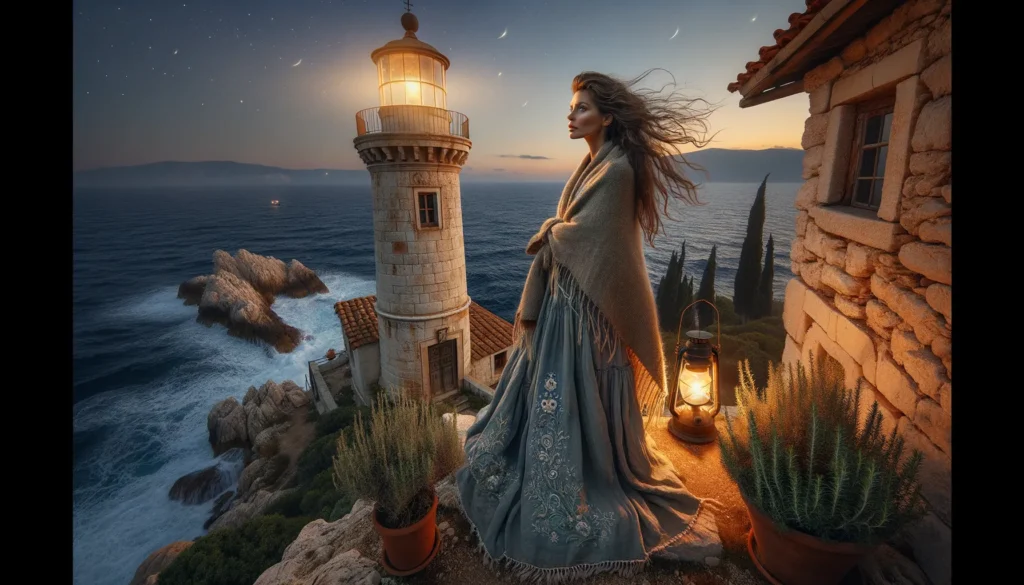 AI-Generated Image
AI-Generated ImageThe days that followed Elias’s departure spun slowly, as though the very island held its breath in his absence. Mornings dawned in soft silence, disturbed only by gulls circling over the half-repaired fishing vessels and the church bell ringing once, then twice, for the hour. Coastal winds carried the cry of sails and the scent of brine, but not his homecoming—not yet.
Adriana stood on the cliffs each day at dawn, eyes fixed toward the outer horizon. She had begun her watch not out of longing alone, but out of purpose. It wasn’t just about hoping Elias would return—it was about standing where she always had, firmly, even when the tide pulled others away.
Her shawl, the one with the seafoam stitching, had worn thinner in the wind. Some mornings, she wrapped it tighter with resolve. Others, she let it fall open like a flag, choosing to feel the chill fully. She needed to remember she was still here, still rooted to this place, even as the man she loved chased salvation for others at sea.
In the afternoons, Adriana busied herself inside her coastal cottage, blending oils and herbs for salves and preserving elderflowers for the start of winter. There were orders to deliver and neighbors to check on—especially Mrs. Salgado, who’d injured her hip during the storm. Adriana carried warmth, tea, and laughter to those she cared for, but the ache in her chest never truly ebbed.
And still, Sebastian waited.
He came not as an accuser this time, but as a presence—stoic and steady like driftwood washed ashore. One evening, as sunlight dappled through olive leaves and the scent of citronella hung in the air, he found her tending the garden beside her cottage.
“He hasn’t returned yet,” he said, folding his arms as he stepped closer.
“No,” Adriana replied. “And yet, I feel him more than I did when he was gone for ten years.”
Sebastian tilted his head. “I should resent that, shouldn’t I?”
“I don’t know,” she said, brushing her hands together. “Does it matter if you do?”
He gave a small, almost rueful smile. “You’ve grown harder—and softer—all at once.”
“No,” she said quietly. “I’ve only grown more certain.”
The garden was quiet for a time. Bees moved between rosemary blossoms. The waves below crashed slowly, as if weary from their own weight.
Sebastian looked down. “You still love him.”
She didn’t hesitate. “I do.”
Sebastian sighed. “And if he doesn’t return?”
“Then I’ll still love him. And I’ll live, Sebastian. But I won’t build a life from the absence of someone just because I’m afraid to stand alone.”
He looked at her a long moment, his pride slipping just enough for tenderness to show through.
“You always had more strength than both of us,” he said.
She turned to him then, her smile kind, but firm. “I do hope you find what you’re looking for, Sebastian.”
“And I hope the man who holds your heart knows what he holds,” he said. Then he bowed his head—not in defeat, but in respect—and walked away into the evening fog.
Adriana remained in her garden, watching the silver light mingle with lavender shadows across the sea. She tensed, just barely, when she heard light footsteps behind her. But it wasn’t Sebastian.
“Your heart speaks louder than you think,” came Ana Mendez’s voice.
Adriana turned to the young woman, her former neighbor, arms balancing a bundle of wool and rosemary.
“You heard everything?” Adriana asked.
“Enough.” Ana offered a wry smile. “And I’ve heard rumors. Heard the lighthouse flame’s been lit each night without fail. Must burn so bright the moon is questioning her own glow.”
Adriana chuckled in spite of herself. “The island watches.”
“It always has,” Ana said, handing her the herbs. “But I think this time, it’s rooting for you.”
Later that evening, Adriana carried a lantern up the narrow stone stairs of the lighthouse tower. Each step a memory. Each step a promise. When she reached the top, she passed her hand gently over the thick ridged glass of the beacon.
The lamp was fed fresh oil and the flame flickered high, golden and strong.
Her heart beat with such clarity then—not with fear or waiting, but with faith. Elias had left not to escape—but to serve, to carry their shared compass beyond the safety of shore. And whatever return awaited her, she would meet it not with a question, but with hope.
As she rested her palms against the cool steel of the lantern base, looking out across the horizon, the sky blushed with the deep hues of dusk. Far out to sea, stars fractured their way through the veil of night, scattering like soft whispers calling their own names.
And Adriana, rooted there in the flaming tower of stone and sea spray, was no longer a woman waiting.
She was love’s anchor.
And she was ready—whatever the tide would bring.
Chapter 8: Winds of Change
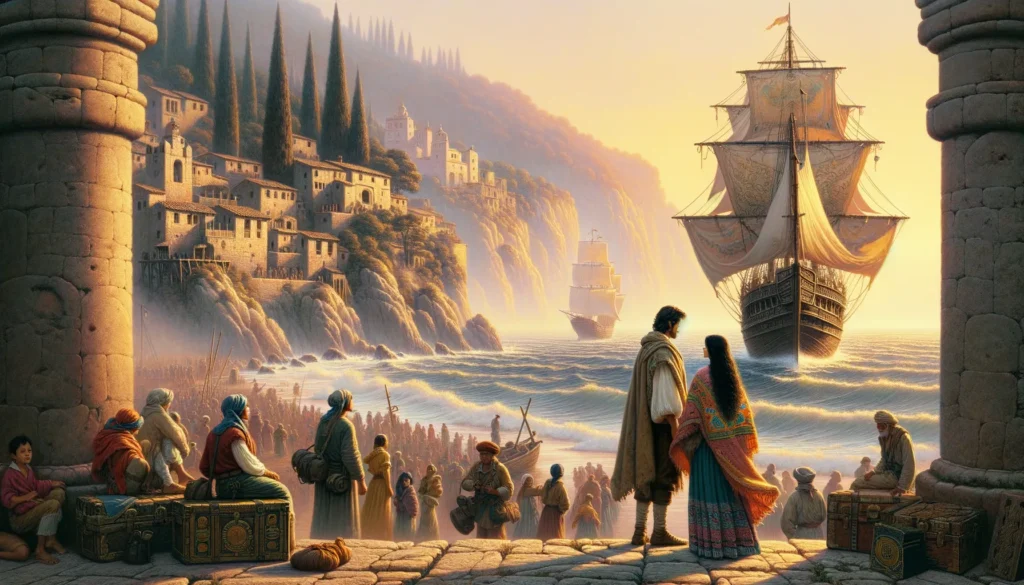 AI-Generated Image
AI-Generated ImageThe wind shifted on the third morning.
Not in how it stirred the branches of the old cypress trees lining Porto Santo’s cliffs, nor in how it lifted the sails of the fishing boats easing toward shore—but in something deeper. The wind carried weight that morning: the weight of wordless expectation, of breaths held, of hearts braced against both storm and hope.
Adriana felt it before she heard it—the creak of wood in the harbor, the sudden flurry of urgent footsteps, the first cry of a boy running uphill with a voice too quick to catch.
She was already rising from her garden stool, her embroidered satchel abandoned mid-stitch, her fingers trembling with the familiar rhythm of uncertainty.
But the wind whispered it clearer than voices did: the ship had returned.
By the time she reached the bluff, townsfolk had begun to gather along the narrow path overlooking the dock, faces lifted into the morning light, eyes squinting toward the sea’s edge.
The sails appeared first, sharp and angled clean against the horizon. Then the hull—a deep, weatherworn chestnut, paint chipped from sea salt and sun but proud nonetheless. Even from this distance, Adriana could tell by the cut of the rigging and the curve of the bow that it was the Sea Wren.
Elias’s ship.
Her heartbeat quickened—not with panic, but with the ache of every promise balanced on a tide.
Below her, children cheered. Fishermen tipped caps against their brows. Merchants, whose shelves had thinned from dwindling grain, stepped out into sunlight with guarded hope.
And he—Elias—was on the bow.
She could just make out his silhouette—a steady shape against the sweep of sea foam and gulls. Tall and unmoving. Wind in his hair. One hand gripping the rail, the other raised in a low wave that didn’t beg for attention, but offered it.
He had returned.
By the time Adriana reached the docks, the vessel had moored and was already drawing a crowd. Barrels of flour and crates of dried citrus fruit and preserved meats were being carefully hoisted from belowdecks. Roughened crew moved quickly, giving greetings laced in laughter—even joy.
Elias descended from the gangplank last, boots wet from sea spray and coat creased from wear. But he stood straight as he stepped onto Porto Santo’s stone, and the moment his foot touched land, the wind softened — as if it, too, recognized home.
She moved through the crowd. He saw her instantly.
For a heartbeat, they simply looked at one another.
Everything else disappeared: the voices, the clamoring carts, the grateful cries of the townspeople seeing salvation in canvas and cargo. All that remained was the space between them—the space that had once stretched across oceans.
Now, it was just a few slow steps.
He took them first. “Adriana,” he murmured.
She breathed his name with a stillness that carried through her entire frame. “You’re safe.”
“I promised I’d return,” he said. “And this time, I keep my promises.”
They didn’t rush into an embrace—something even the sea might envy. Instead, they stood close, so close that their shadows stranded into one another on the planks below.
“I didn’t realize just how much this place needed you,” she said softly.
He shook his head. “It wasn’t me they needed—just help. But you… you never left. You were their anchor.”
“You brought grain,” she said. “But you also brought hope.”
He reached for her hand. Their fingers, so familiar and sure, fit with quiet grace.
“I brought what was needed,” he said. “But I came back for you.”
A hush broke over their conversation as the town bell rang once—then again—and again. Islanders paused to look up, to offer silent thanks, or perhaps to mark this moment when hardship had bent—but not broken—their small, weathered world.
Later, as the stores were inventoried and shared plans scribbled atop ledgers in the town square, Adriana walked with Elias through the winding lanes of their childhood—past the stone bench beneath the fig tree, past the cracked fountain, past the chapel whose sun-painted glass still told tales of faith and forge.
She showed him the garden she kept behind her cottage, now flushed with new lavender and thyme. He watched her hands as she brushed a stem open, releasing its scent with reverence.
“What now?” she asked that evening, as they stood atop the cliffside where once, as children, they raced winds and dared dreams.
Now, the sky ignited in streaks of coral and gold, the ocean below sighing in deep, gentle waves.
“Now we begin again,” Elias said, voice quiet but steady. “If you’ll have me here—not as someone passing through—but as someone who chooses this place. Chooses you.”
Adriana looked east, where the lantern in the lighthouse still burned bright, though the skies were clear. She smiled.
“You already belong,” she whispered. “You always did. Even when you were lost.”
He turned toward her then, the salt in his hair silver from sun and memory. “And you?” he asked.
“I’m not waiting anymore,” she said. “I’m living—here, with you. Wherever that leads.”
The wind curled between them once more, but now it wasn’t hollow with longing. It carried birdsong, the scent of rosemary in bloom, and the murmured hush of the sea embracing the shore.
Overhead, stars waited patiently to appear.
On the cliffs of Porto Santo, two hearts—long parted—stood firm beneath the winds of change.
The tides had turned.
And they stood together, not as star-crossed pieces, but complete—bound not by time, but by choice.
Chapter 9: The Duel
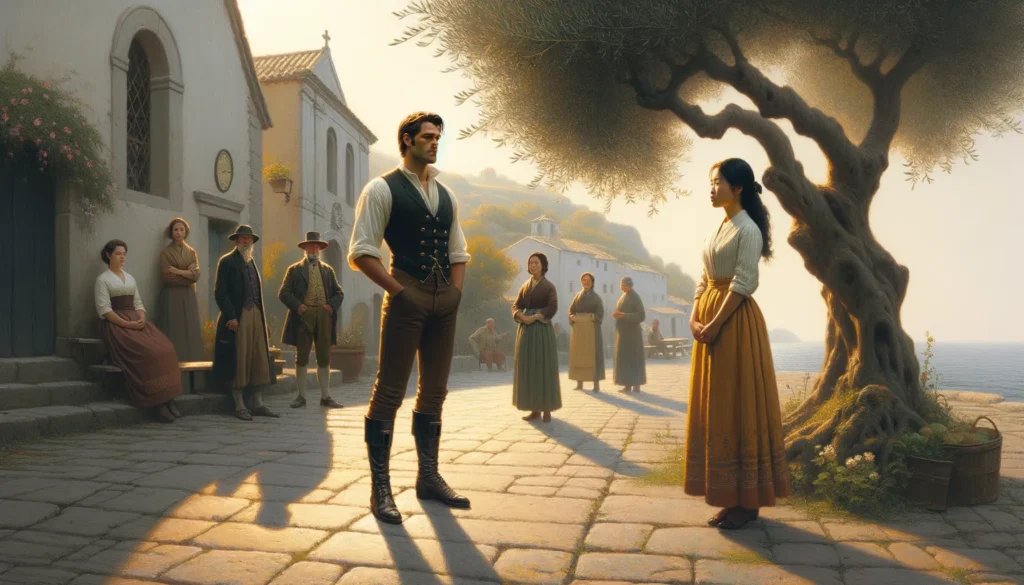 AI-Generated Image
AI-Generated ImageThe morning air was heavy with a tension that even the wind could not carry away. Overhead, gulls circled in wide, uneven arcs, their calls breaking the hush that had settled over the village’s stone-paved square. Porto Santo had seen disputes—old men squabbling over nets, children crying over lost trinkets—but never anything quite like this.
Elias stood at the edge of the plaza beneath the watchful gaze of the chapel’s bell tower, his hands gloved, his coat buttoned clean despite the warmth in the air. There was steadiness in his posture—but not stillness. No, he was more like the tide before the surge: quiet, but moving.
Across from him, Sebastian Vale waited beneath the canopy of an aging olive tree, spine straight, arms folded with the poise of someone used to commanding a crowd. His fine linen vest was unwrinkled, his boots polished. Yet, something tensed in his jaw told the truth of things—he was here for more than formality.
There would be no pistols, no drawn blades—too much blood had been spilled on other beaches. This was a duel not of weapons, but of words and wills.
And it had been brewing for far too long.
The townsfolk stood gathered in small clusters, whispering. Ana Mendez stood among them, her arms crossed over her chest, brows furrowed. Others nodded toward Adriana, who approached from the path leading from her cliffside cottage. She wore no shawl today. Her dark braid was unbound, caught loosely by a ribbon, and her face bore the calm strength of someone who refused to be claimed as a prize.
Adriana stepped forward, past the murmurs, and positioned herself between them—close enough to either man that her presence was undeniable. Neither turned away.
“You asked for this,” she said plainly. “Let it happen—but let it end here.”
Elias dipped his head. “I agree.”
Sebastian said nothing at first. His eyes, however, held something flaring just beneath the surface, too long buried. “Then speak first, Mercer.”
Elias looked toward the villagers, not for validation but for truth. Then he turned fully to Sebastian.
“I never meant to be your enemy,” Elias began, his voice carrying easily in the still air. “We were boys once—climbing trees and diving into the surf with no fear of what came next. Somewhere along the line, our paths split—but not because I abandoned you or this place. I left because I didn’t know how to carry the weight of being here without drowning beneath it. That was my failing. I see that now.”
Sebastian folded his arms more tightly. “And in your absence, others picked up what you dropped. I carried that weight—helped Adriana, helped this village, took care of what you turned your back on.”
Elias stepped forward a pace. “And for that, you deserve thanks. You became what the island needed. But we both know this—this fight—it isn’t about gratitude. It’s about her.”
Adriana’s eyes hardened slightly, and Sebastian grimaced. “She chose you once. And when you left, she stayed loyal. Even when I stood beside her—as a friend, as a partner—she never… she never saw me.”
“She saw you,” Adriana said then, gently. “She just didn’t love you the way you wished. And I’m sorry for that. You deserved someone who would.”
Sebastian turned toward her then, his expression unreadable—leaning somewhere between longing and defeat.
“I spent years proving I was worthy,” he said. “To her. To the village. And still… it wasn’t enough to outweigh a memory.”
“It was never about proving you weren’t worthy,” said Elias, this time softer. “It’s that I never stopped loving her. And when I returned, I didn’t come to reclaim anything. I came to build anew. If she had told me to leave, I would have. But she… she opened the door.”
Another heartbeat passed. The only sound between them was the high cry of wind catching the corners of a loose window shutter.
Then Sebastian stepped forward, stopping directly before Elias—his expression unreadable, his fists just barely clenched, as though deciding between fight and surrender.
“You’re not the same boy who ran,” he said finally, voice tight. “And maybe… maybe I kept insisting you were so I wouldn’t have to face how much we both changed.”
Elias didn’t look away. “We did change. But that doesn’t mean we must be enemies now.”
Sebastian glanced at Adriana, then at the gathered villagers—people he had grown alongside, people who had depended on him when times were lean and Elias was gone.
At last, he nodded—sharply but silently.
“I accept it,” he said. “Not because I forgot the years you were absent, but because I see what you’re willing to give now. Just…” He hesitated. “Treat her with the care you never gave yourself.”
Elias blinked once, clearly absorbing the weight of that sentiment. “I will.”
Sebastian turned to Adriana. “I will always care for you. But I won’t stand in the way anymore if he sees you for what you truly are—not a haven to return to, but a lighthouse guiding others home.”
She smiled, aching and full of grace. “Thank you,” she said. “For everything.”
Sebastian turned then, walking away from the square without another word. No fanfare. No bitterness. Only the quiet dignity of a man unburdening himself at last.
The crowd slowly thinned, sensing release in the air—like a storm tide receding without wreckage.
And then it was just Elias and Adriana.
“Are you alright?” she asked.
“I don’t know,” he said truthfully. “But I feel lighter.”
“Then perhaps, for the first time, the tides truly belong to you.”
They stood close, the last curls of wind threading between them.
“I faced him honestly,” Elias whispered. “Not to win you. But because I could no longer carry silence as my shield.”
She stepped close, reaching for his hand. “And now?” she asked.
He held her gaze, steady and open.
“Now I’m not running anymore.”
Adriana nodded, then leaned forward, touching her forehead gently to his—a wordless answer, steady as the tide.
Together, they watched the horizon rise, marked not by conflict or history, but by something else at last:
Peace earned.
And the promise of something still to come.
Chapter 10: A New Horizon
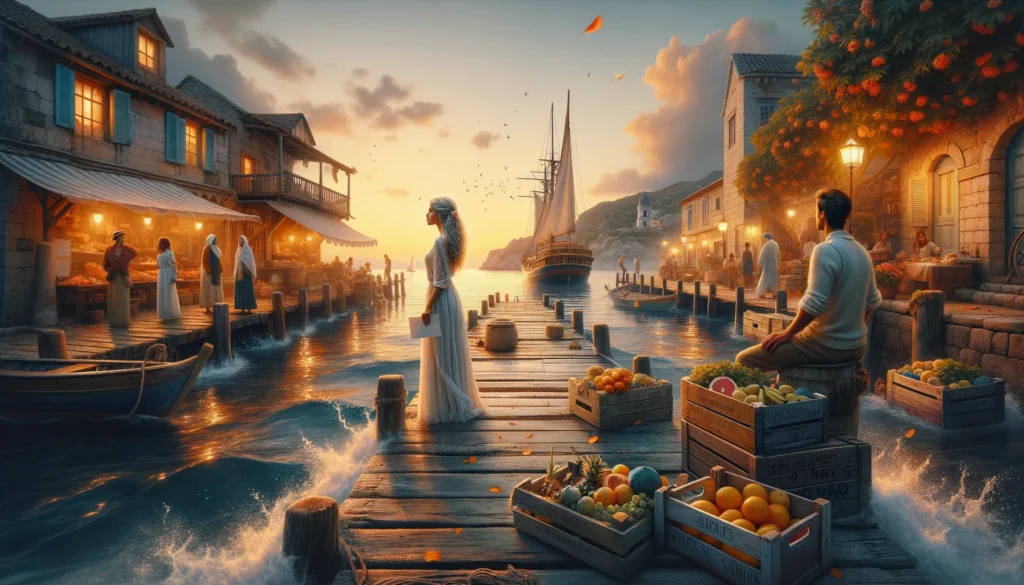 AI-Generated Image
AI-Generated ImageThe dock still bore the scent of fresh sawdust and drying citrus, remnants of the crew’s earlier unloading. Silhouettes bustled across the gangplank, calling out inventories in clipped, purposeful voices. But amidst this thrum of movement, Captain Elias Mercer stood still, centered against the tide of hands and haste, the sea painting his boots in quiet foam.
He watched as families gathered near the cargo, wide-eyed children clutching loaves of bread, women dabbing their eyes with kerchiefs, fishermen offering thumbs pressed to their hearts in thanks. They had not assembled to laud a hero’s return—but to celebrate a tide that had, at last, turned in their favor.
And yet, Elias’s thoughts drifted elsewhere.
He saw in the ripple of sailcloth not the success of his voyage, but the slow-revealing pattern of his life: the long currents he’d followed away from Porto Santo, the storms weathered within, and now this—standing on the dry wood of home that no longer threatened to drift away beneath his feet.
Adriana moved quietly beside him, her presence a calm tether. She didn’t speak, just watched as he did—allowing him the peace to gather his thoughts from the breeze.
“You’ve done something lasting,” she said softly. “This trade route… it will change everything.”
His voice took time. “I wanted to bring something that mattered.”
“You brought more than that.” Her hand brushed his.
A call rose from further amidst the docks—Jules Godfrey, waving a sheaf of new correspondence fresh off the hands of the mainland envoy.
“Captain!” Jules jogged up the slope of the embankment. “Word from Lisbon. They received your trade log. Commodore Henrique asks you to join a naval consortium—map new routes in the African straits. He says there’s honor and title in it, if you want it.”
Elias blinked, the future dangling before him like a sail waiting to be caught by wind.
Adriana glanced at him gently but with no loss of composure.
He studied the letter, then the island.
“Tell them no,” Elias said at last.
Jules raised a brow. “You’re sure?”
“I didn’t forge this path to leave it behind. This island deserves more than someone who only visits between departures. I—I want to stay.”
Jules nodded, silent for a breath. Then, with loyalty that had never faltered, he saluted. “Understood, Captain.”
When Jules strode off to arrange the next wave of unloading, Adriana stepped close.
“You could’ve gone,” she said. “That offer… half the island would say it’s destiny.”
“It was once,” Elias replied. “And I went chasing futures across unfamiliar seas for years, thinking I’d find myself at the other end. But I realize now what I couldn’t then.”
He turned to her, his eyes steady.
“My horizon was never out there—it was here. It was you.”
A quiet nabbed the air between them.
“In the north fields,” Adriana said suddenly, “there’s talk of building a new granary. The hillside walls have cracked since last winter, and they’re asking for stone. I thought maybe—if you’re serious about staying—we could build more than a home.”
He smiled. “You’re inviting me to help build your granary?”
“I’m inviting you to build something that sustains this island—even when the tides shift.”
He laced his fingers through hers. “Then let’s begin.”
The sea breeze shifted again, lifting her hair from her brow as the sun began its slow slide west. Children scattered petals from mezzanines as the first bag of Madeira citrus burst open with scent. Even the gulls above circled with purposeful grace.
Later that evening, lanterns lit the winding cobblestones of Porto Santo like stars drawn from the sea and laid at their feet. Music drifted on the waves—simple melodies strummed on mandolins and carried through open windows. No parade, no ceremony. Just life, fully lived.
Elias and Adriana stood arm in arm beside the old fig tree, its branches now taller than either had remembered. Beneath its shade, they looked out together, not toward escape, but toward permanence.
Not everyone got to return from the wind.
But Elias Mercer had.
And in his return, he had found both an ending—and a beginning.
For some tides take.
Some return.
And some carry you home to a new horizon—where love is not just remembered, but lived.
Together, they stepped forward, leaving footprints where the sea once wandered.
Into tomorrow.
Chapter 11: The Voyage
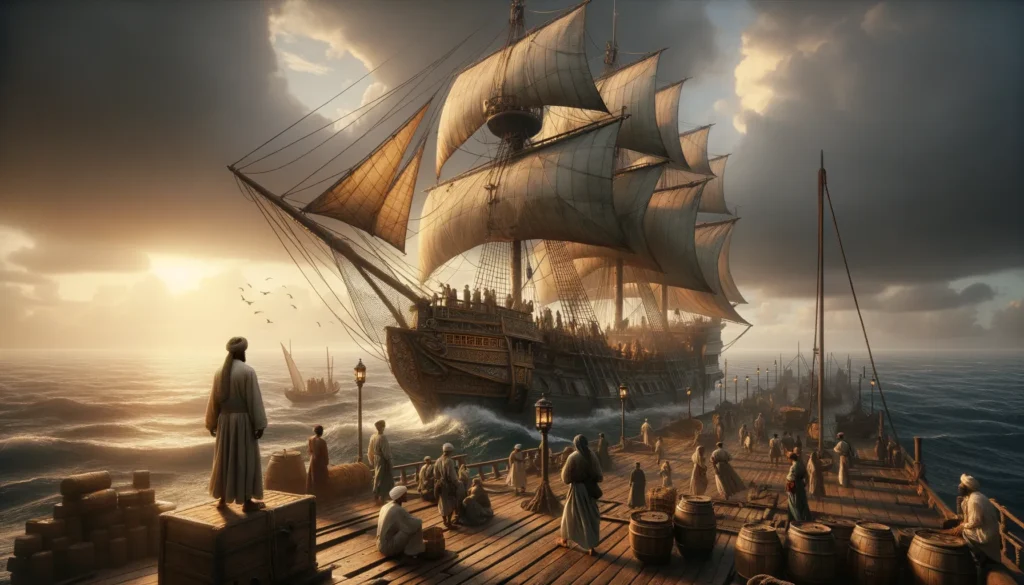 AI-Generated Image
AI-Generated ImageThe Sea Wren heaved from the breakwater just after dawn, her sails catching the new wind as though they, too, remembered what it meant to return with purpose. She cut through the Atlantic like a pen writing her second chance upon the open sea—sure, clean, unyielding.
Elias Mercer stood at the helm, boots planted firm, hand resting on the weathered grain of the rail. The salt wind tugged at his collar, and though the horizon stretched wide and unknown before him, he felt anchored—not to the vessel, not to the mission—but to the very idea of home. Adriana’s voice was still in his mind, not as an echo, but as a compass: steady, sure, and warm as the eastern sun.
The Sea Wren glided out of the bay with a grace honed from countless crossings, her crew moving with practiced rhythm around cargo holds packed with grain markers, written ledgers, and lanterns for night-sea navigation.
It wasn’t merely a supply trip.
This was a test of faith—faith in trade agreements newly brokered, in seas that could be as dishonest as they were deep, and in the deeply personal truth that one’s past doesn’t always disqualify them from a future.
Jules Godfrey approached mid-morning, coat flapping like a wing behind him as he braced against the gusts. “Currents are faster than expected. If they hold, we’ll reach Gibraltar two days early.”
Elias nodded, eyes scanning the tangled arc of clouds beginning to brew on the southwestern horizon. “And if they don’t?”
Jules cracked a grin. “Then we do what we always do. We sail through.”
The words settled between them. Not bravado—just belief.
As the hours unfolded, the voyage showed its teeth. A squall rose beneath the Spanish coast—a low-stalking thing with hungry winds and a belly of rain. The Sea Wren flexed beneath it, her masts groaning under pressure, her bow slicing through swells that glinted like steel.
Elias stood through it, soaked and shouting orders with the sureness of a man who had survived darker storms both within and without. He didn’t fear the gale. Storms, after all, had been his company for years. They didn’t rattle him anymore—not now that he’d learned they weren’t something to flee, but to face with open eyes and braced feet.
When the storm passed, it left the sky cleaner than before. The crew’s laughter spread across the deck like sunlight on wet timber, their unity held fast by shared trial. They’d inherited Elias’s steadiness; he saw it in each line drawn taut, each sail retied.
At night, under stars that rippled like scattered pearls across the dark water, Elias kept to his journals. Adriana’s ribbon—twilight blue and wind-soft—marked a page, a quiet constant even as waves licked the hull below.
His entries were no longer log notes of miles and temperatures. They were letters. Sometimes to her. Sometimes to himself.
“Day three,” he wrote, fingers smudged with ink, “I wonder if you ever sit by the lighthouse now that it no longer burns for my return. Perhaps you simply like the view. Perhaps the light was never intended to guide others toward us—but always meant to remind us where we belong.”
As they dropped anchor along the Moroccan coast, merchants and stevedores greeted them with guarded courtesy that quickly shifted to admiration. They’d heard of Porto Santo’s plight. And now, trade agreements were signed—not in urgency or desperation, but through dignity, fair barter, and shared understanding.
By the fifth day, the hold brimmed with salt, citrus peel, and sacks of rice sealed with colored wax. The outbound cargo had shifted to olive oil and artisan tools carved in the islands—gifts born of resilience, not charity.
Elias stood atop the deck again as they made ready to sail home.
“Everything fits, Captain,” Jules said. “Barely, but it fits. She’s heavy. Storms will be slower going. We’ll need luck.”
Elias smiled. “We make our own luck. With care. With truth.”
“And with love?” Jules raised a brow.
Elias chuckled. “With love, yes. If we’re clever enough to name it.”
The voyage home was not without tests. But nothing broke them. When the southern stars gave way to northern patterns once more, and the wind carried the ripe scent of hillsides Elias had come to measure by their blooms and wind turns, the crew knew before he said a word—they were near.
Porto Santo shimmered in the distance on the morning of their return. Warm smoke curled from chimneys of cottages. Children lined the hills before the docks came into full view, and the white pillar of the lighthouse rose like a sentinel from stone, its lantern dim in full daylight—but waiting, nonetheless.
As The Sea Wren nudged into the bay, cheers met them like music.
And there, among them, stood Adriana.
Her shawl twisted in the morning air, hair braided with new flowers and the same twilight ribbon. Her hands cupped around each other at her waist, and though her posture was still, her eyes sparkled like waves stitched in morning gold.
Elias didn’t rush from the helm—not this time. He let the Sea Wren dock as she had earned to—with grace and calm. Only then did he descend the gangplank to the cheers of thankful hands and grateful eyes.
But none of it was for him. Not truly.
He walked to her. The crowd faded. The sun held its breath.
He didn’t speak at first.
Neither did she.
Then:
“You came home,” she whispered.
“Because this”—he gestured gently to the sea, to the island, to her—“is where I finally belong.”
She stepped to him, not with urgency or question—but with quiet, steady resolve.
And as they faced one another, the wind curled around them like a thousand memories returning as one.
He took her hands.
“I made the voyage,” Elias said. “And in doing so, I realized something.”
She waited.
“That love isn’t what keeps us from our duty. It is our duty.”
She smiled—sunlit and sea-borne all at once.
“I know,” she whispered.
And in that moment—amid dock cries and gulls and sails gone slack in stillness—there was no storm, no rivalry, no time that could undo what they had claimed.
Not a homecoming.
But a new voyage.
Together.
Chapter 12: Homecoming
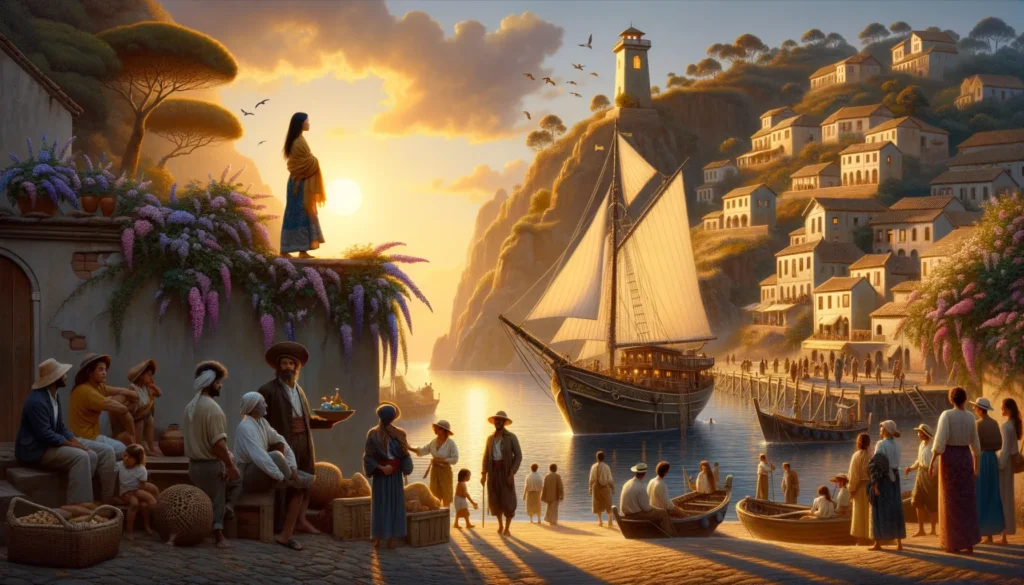 AI-Generated Image
AI-Generated ImageThe sea had gone quiet—not stilled, exactly, but softened, as though it too exhaled after a long, arduous holding of breath. The morning sun had yet to crest the highest of Porto Santo’s ridges, but already its gentle gold light spilled over the terraced hills and white-stone cottages, warming the blush-colored walls and catching on wind-brushed olive leaves.
On the southern dock, just past the edge of the old shipwright’s wharf, a small gathering had formed—modest, like the island’s people—yet no less significant. Children clutched their parents’ hands in anticipation. Local merchants stood beside old fishermen whose skin bore the lines of both weather and wisdom, eyes trained on the mouth of the bay. The bell at the chapel hung silent, but its presence loomed like a heartbeat, watching.
And then, sails.
White and weather-tested, like stretched canvas wings reaching toward the sky. The first glimpse of the Sea Wren’s return.
Adriana stood apart from the crowd, just atop the slope near the baker’s path, where flowering lantana spilled heavily over the stone wall. The purple and orange blooms danced around her ankles as she took a slow, grounding breath.
He was coming home.
Though weeks had passed, time had not dulled her memory of Elias’s gaze before he departed—clear, steadfast, holding the weight of purpose without hesitation. She had seen something in his eyes then that had eluded her in their youth: not just love, but direction. A man no longer fleeing, but choosing.
It was not the return she awaited—it was the life that would begin after.
The Sea Wren docked with elegant ease, her hull gently brushing the wood pilings as her crew leapt into motion. Ropes were thrown, knotted, and pulled taut. Crates and supply barrels made their way down split gangplanks like rushes in a mountain stream. Cheers rippled across the crowd, not raucous but reverent—joy edged with relief and pride.
Elias was the last to disembark.
His boots landed with minimal ceremony yet undeniable presence. Salt crusted the shoulders of his coat, and his hair bore the wind’s imprint, but he moved as someone embedded now—not a returning stranger but an enduring pillar once thought lost.
As he scanned the gathered faces, his eyes found hers.
They held.
Not for drama, not for flair. Simply certainty.
She stepped forward.
Neither rushed.
When they stood face-to-face, the world hushed itself again, as if even nature understood the gravitas of this long arc bending homeward.
“I see you kept the lantern lit,” Elias said, his voice low yet warm, worn from ocean wind but sharpened by truth.
Adriana smiled. “Even when there was no one to guide, even when the storms came—I kept it burning.”
He reached into the inner pocket of his coat, withdrawing a folded square of parchment—weathered and frayed at the corners, edges curled with time. “I read your letters every evening,” he whispered. “Even when Casablanca’s nights curled like sand through my fingers, you were there to steady me.”
She reached up, ran a gentle hand along the collar of his coat. “You brought food, Elias. But more than that, you brought back hope. Not just for this island, but for yourself.”
He laughed softly under his breath, shaking his head. “I think… I came back for both. With a map I never trusted before.”
She raised an eyebrow, teasing. “And what was that map?”
He took her hand, held it between calloused fingers. “A memory of your voice. And a future I didn’t know how to name until now.”
The village absorbed them soon after—conversations blooming around them like the island’s ever-resilient lavender. The mayor clasped Elias’s arm in thanks. Ana Mendez presented Adriana with fresh-twisted cord to tie the herbal satchels she had been preparing for spring planting. Children followed Elias like ducklings toward the crates of goods now piled on the dock.
But even amid the movement of life resumed, they found moments—quiet spaces just between breaths.
Later, they walked side by side through the afternoon markets, past painted ceramic tiles and bundles of dried mint hanging from awnings. People passed with nods, with blessings breathed beneath their smiles.
Adriana turned toward Elias as they passed beneath the arch near the chapel. “Do you know what this is?”
“What?”
She swept her gaze across the sunwashed square, the murmuring breeze, the children’s laughter echoing off white stone. “This is peace.”
He looked at her, not just with affection, but with devotion. “This is home.”
They reached the bluff by evening—all warmth casting its final golden-song glow across the water. The lighthouse flame had not yet been lit. Adriana held the long-handled flint in her hand.
“Shall we light it?” she asked.
Elias took a step closer. “Or shall we let it rest tonight? Just once. Let the world sleep knowing all its travelers have come safely to shore.”
She smiled, slipping the flint back into its cedar box.
Side by side, they stood at the cliff’s edge, watching the sky change color—slow as forgiveness, steady as the tied knot of two souls tethered by choice.
Below them, the sea whispered like an old friend.
Beside them, the village stirred gently in the twilight.
And before them, the horizon stretched wide, boundless.
Not calling them away anymore.
But waiting—for whatever they would build together.
This, Adriana thought, was not the end of a journey.
This was the place where all journeys began again.
Home.
Chapter 13: Promise of Tomorrow
 AI-Generated Image
AI-Generated ImageThe morning sky arched wide and cloudless above Porto Santo, painted in the gentle hues of dawn—blush pink fading into pale cerulean. A sea breeze brushed the island like a sigh of contentment, carrying the scent of rosemary from Adriana’s garden and the salt-laced laughter of fishermen already casting their nets.
Elias Mercer stood on the familiar cliff path he had once walked as a boy, then again as a man searching for atonement. Now, with the past reconciled and the future unrolling like a scroll in the morning light, he stood at peace.
Beside him, Adriana gathered her shawl as the wind tugged against its corners. Her hand was nested in his, fingers comfortably laced through his own. They had stopped speaking for a few moments, content with the rhythm of silence, of breath and breeze and the seabirds wheeling overhead. The path behind them led back to the village, to the markets and stone courtyards and the whitewashed chapel where bells chimed to call the faithful.
But the path ahead—though less worn, less certain—was theirs alone.
After the voyage, after the duel of hearts and words, after the lighthouse flame had burned both for warning and welcome, the village had begun to shift—not just in its outward fortunes, but in spirit. The granary plans had moved forward with Elias’s help, its foundations marked in chalk across the north field. Adriana’s tinctures now reached fishermen as far as Funchal, her reputation as a healer and herbalist growing. Young Ana Mendez had apprenticed herself to her, eager to learn not only the properties of herbs but the power of steady compassion.
Porto Santo was blooming.
And so were they.
Elias extended a folded paper toward Adriana—a sea chart, its edges still creased from use.
“What’s this?” she asked, brow arching as she took it in her free hand.
“Something I used to pore over when I couldn’t sleep,” he said with a soft smile. “But now… now I use it differently.”
She unfolded the chart, revealing not distant trade routes or hidden straits but something far more intimate—drawings sketched lightly in the margins: their cliffside cottage, the outline of a granary roof, a stylized herb bundle, a small boat anchored not in motion but at rest.
“A map of home,” she whispered.
“I drew what matters,” he replied. “What will last.”
She looked up, sun catching the threads in her dark hair. “Even anchored sails can be lifted again, you know.”
“I want to lift them,” Elias said. “But not to chase the unknown. Only to carry what we build here to those who need it. Trade, supply, ferry. A vessel in service of others—and us.”
“You mean to captain a ship and still come home each night?”
“Not every night. But most,” he said. “And when I’m gone, I want it to be with purpose—not regret. Never again regret.”
She considered his words, then turned her gaze toward the surf below where the tide was tracing spiral patterns in the sand.
“What we build here,” she said, “shouldn’t be only for us. This island gave us a chance when we thought chances had passed.”
He nodded. “A family, then. Here, in time. When we’re ready.”
Her eyes lit with amusement. “You’re ready?”
“Ready to begin,” Elias said. “Not for what I expected life to be—but what it can be.”
They stood in easy closeness, their arms brushing, the path ahead bathed now in sunlight.
“Do you remember,” Adriana began, “when we said goodbye by this same shore?”
“I remember,” he said solemnly.
“And now?”
“No more goodbyes,” Elias promised. “Only beginnings. Only promise.”
She reached out, and their foreheads touched in quiet understanding—two souls once torn in opposite directions, now whole again.
The morning bell rang from the village below. Children called to one another among the fig trees. The lighthouse stood in the distance, its flame unlit for the day, but its presence still strong—a symbol no longer of waiting, but of light chosen, tended, and shared.
Together, Adriana and Elias took the first step down the path toward the village—not hurried, not hesitant. The sea flared silver to the east. The day unfolded before them, full of work, of laughter, of possibility.
Here, at the edge of all the things they thought they’d lost, they had found something stronger: the courage to love again, and to love rightly.
Not bound by duty. But sustained by it.
Not swept away by fate. But carried together—by the promise of tomorrow.
As the tide rolled gently onto distant shores and the sun rose higher over Porto Santo, so too did the next chapter of their lives begin, rooted not in longing but in choice.
And the sea, faithful as ever, bore witness.
Epilogue
 AI-Generated Image
AI-Generated ImagePorto Santo, 1852
A decade had passed, and yet the cliffs still sang with wind.
The village had grown—not loudly or quickly, but the way tide pools grow strong against stone. Children now ran barefoot past the rebuilt granary, their laughter echoing between vines of bougainvillea and singing windows. A new schoolhouse overlooked the southern docks, its slate roof gleaming beneath the morning sun. The winds that once whispered of departure now hummed steady songs of belonging.
Near the edge of the bluff, where the rosemary bushes swayed wild and fearless, the old house stood proud beneath its tiled roof. Lavender once again lined the walkway. The gate no longer hung or groaned, but swung firm on mended hinges painted deep green.
Inside, the scent of candle wax and citrus drifted through the parlor. Books lined newly built shelves beside a hand-carved globe dusted with use. Beside a wooden bureau, a cedar chest held letters—tied now in ribbon of a softer blue.
In the garden, Adriana bent over a bed of thyme sprouting between marigolds and mint. Wisps of silver threaded through her hair, but her hands were just as steady, her smile just as whole.
She looked up as she heard the porch creak.
Elias stood there, a little slower now but still tall, the salt in his hair no longer from the sea, but time. A carved cane rested against the doorframe, though he rarely used it. In his other hand: a small paper bound in rough twine—not a letter, but a story.
He came to her with a crooked smile.
“For you,” he said. “First draft.”
Adriana wiped her hands on her apron. “You finished it?”
He nodded. “Three hundred pages of tides, betrayal, return, and… perseverance.”
She took the manuscript slowly, cradling it as one might a fragile shell found by accident.
“I hope it ends well,” she teased.
His grin deepened. “Only because of a lighthouse keeper who wouldn’t stop lighting the way.”
Their hands touched, familiar as morning light. They stood a long moment in silence, the kind where nothing needs explaining because everything has already been spoken, forgiven, and chosen.
Below, ships still docked and departed, their sails snapped by sun and fate. But Elias’s voyage was no longer toward the line where sky met sea.
It was here.
Rooted.
Shared.
Together.
As twilight spilled lavender and rose across the sky, the lantern in the lighthouse warmed to life once more—no longer a beacon for rescuing the lost, but a symbol of what had been found and would never again be left behind.
Love. Duty. Home.
Not bound by maps.
Only by hearts.
And the tides, ever turning.
Appendix / Glossary
This appendix is provided to help readers better understand the historical, cultural, and nautical terms used throughout Tides of Destiny. While the novel stands on its own as a fictional work, it draws upon real settings, traditions, and maritime practices reflective of the 19th-century Atlantic world.
Nautical & Maritime Terms
Aft – Refers to the rear (back) of a ship.
Bow – The front section or prow of a ship.
Beacon – A light or signal set high on a coastal structure (such as a lighthouse), used to guide sailors toward or away from shore.
First Mate – The second-in-command aboard a ship, responsible for managing the ship’s crew and day-to-day operations under the captain’s direction.
Gangplank – A movable bridge used by passengers and crew to board or disembark from a moored ship.
Hull – The main body of a ship, including the structure that sits in the water.
Port – The left side of a ship when facing forward.
Starboard – The right side of a ship when facing forward.
Stern – The rearmost part of a ship.
Trade Winds – Steady easterly winds that historically helped sailing vessels travel efficiently across the Atlantic.
Tide – The regular rise and fall of sea level caused by the gravitational pull of the moon and sun; often symbolic of time and emotional states in the novel.
General Historical & Cultural Terms
Commodore – A naval officer of high rank, above a captain but below an admiral. In 19th-century maritime contexts, a commodore often commanded a small fleet or naval station.
Consortium – A formal association of businesses or organizations, typically working together for mutual benefit, often seen in maritime commerce.
Fado – A deeply emotional Portuguese musical genre, often characterized by themes of longing, love, and the sea.
Hymnal – A book of religious songs or psalms used in worship, common in both public and private devotion during the 19th century.
Lisbon – The capital of Portugal and a central trade hub in European maritime history, mentioned as both a destination and origin of goods in the novel.
Madeira – A group of Portuguese islands in the Atlantic Ocean; historically important for trade and known for wine, citrus fruits, and seafaring culture.
Porto Santo – A small island in the Madeira archipelago, known for its rugged coastline, fishing communities, and historical significance in Atlantic navigation.
Rosemary – A fragrant herb often associated with remembrance and fidelity. Used symbolically throughout the novel, as well as in Adriana’s apothecary work.
Ship’s Log – A journal or record of a ship’s voyage, containing information about weather, locations, events aboard, and navigational data.
Character Reference and Relationships (for Reader Clarity)
Adriana Costa – The novel’s central heroine. Strong-willed and deeply loyal, she represents both the heart of Porto Santo and the emotional cornerstone of Elias’s journey.
Captain Elias Mercer – The male protagonist. A former sailor who left behind love and friendship in search of identity and purpose, and who returns seeking redemption and reconnection.
Sebastian Vale – Elias’s childhood friend turned rival. Symbolizes the tension between stability and ambition, and the complexities of love unreturned.
Ana Mendez – A secondary character who serves as both symbolic witness and emotional observer to the story’s central themes. Represents the continuity of village life and echoes unspoken truths.
Jules Godfrey – Elias’s dependable first mate, whose loyalty and calm judgment help stabilize Elias’s inner and outer journeys.
Geographical Locations
Atlantic Ocean – The great sea separating Europe and the Americas, central to the setting and ideological framework of the novel. Symbol of freedom, danger, and the unknown.
Casablanca – A key port city on the northwest coast of Africa, referenced as the destination of Elias’s mission in Chapter 10. Known historically for trade in grain, textiles, and spices.
Cliffside/Lighthouse Setting – The lighthouse at Porto Santo serves as a recurring location of memory, revelation, and emotional grounding for both Elias and Adriana.
Thematic Glossary
Anchor (Symbolic) – Beyond its literal maritime significance, the “anchor” in this novel symbolizes stability, love, belonging, and emotional rootedness. Adriana, in particular, is cast as an emotional anchor to the wayward Elias.
Beacon (Symbolic) – A repeated motif representing hope, guidance, and clarity in emotional darkness. Doubles as both physical and emotional illumination.
Duty – A major theme in the novel, referring to familial, social, and moral responsibility. The tension between duty and personal desire defines much of the conflict.
Homecoming – Explored not only as a physical return but as a spiritual and emotional reconnection to origin, identity, and love.
Love vs. Duty – The central thematic struggle for most of the main characters. Embodied especially by Elias and Adriana, who must decide whether love is an act of passion or responsibility—or both.
Memory – Serves as both a guiding force and a haunting presence. The characters’ memories shape their choices, and facing those memories becomes necessary for healing.
Storm (Symbolic) – Represents internal conflict, emotional turbulence, and the unexpected challenges faced by characters when reconciling past and present.
Additional Notes
Language: Although the narrative is in English, several Portuguese cultural elements are reflected in the customs, names, and daily life of the islanders. Readers may notice traces of Portuguese dialects and traditions embedded within the dialogue and setting.
Historical Realism: While the events and characters of Tides of Destiny are fictional, their lives draw inspiration from real maritime communities of 19th-century Europe, particularly the Portuguese archipelagos and seafaring cultures.
Ship Name: Sea Wren – The choice of name suggests a small, resilient bird known for its migratory habits, mirroring Elias’s journey of departure and return.
Conclusion
This appendix aims to deepen the reader’s immersion into the rich fabric of Tides of Destiny. By understanding the language, setting, and symbolism more clearly, we hope readers can appreciate not only the unfolding drama of love and duty but also the world in which that story is cast—one shaped by wind and will, tides and choices, memory and hope.
About the Author
J. M. Whitaker is a novelist whose heart beats in rhythm with the sea. With a background in maritime history and a lifelong passion for sailing, Whitaker weaves sweeping tales where love and destiny collide along moonlit shores and windswept cliffs. Known for lyrical prose and emotionally resonant characters, Whitaker brings to life stories that explore the delicate balance between duty and desire.
Raised near the northern coastlines of New England, Whitaker’s imagination was first stirred by stories of old shipwrecks, sea legends, and the voices of generations past carried on the ocean breeze. After years spent studying oceanic trade routes and the lives of 19th-century sailors, Whitaker began transforming factual knowledge into vivid storytelling, capturing both the grandeur and peril of life at sea.
When not writing, J. M. Whitaker can often be found teaching workshops on historical research for writers, sailing traditional wooden boats, or exploring coastal towns in search of untold tales. Tides of Destiny is a heartfelt tribute to the sacrifices we all make for love, and to the ever-present pull between the horizon and home.
Frequently Asked Questions
What motivates Captain Elias Mercer to return to Porto Santo?
Elias returns to reconnect with his past, seek redemption for his departure, and face the unresolved feelings he has for Adriana.
How does the relationship between Elias and Sebastian evolve throughout the story?
Elias and Sebastian start as childhood friends, but their relationship becomes strained due to rivalry over Adriana. Eventually, they come to a mutual understanding and respect after confronting their past.
What role does the lighthouse play in the story?
The lighthouse symbolizes hope and guidance, representing both the physical and emotional light that leads Elias and Adriana back to each other and to their home.

